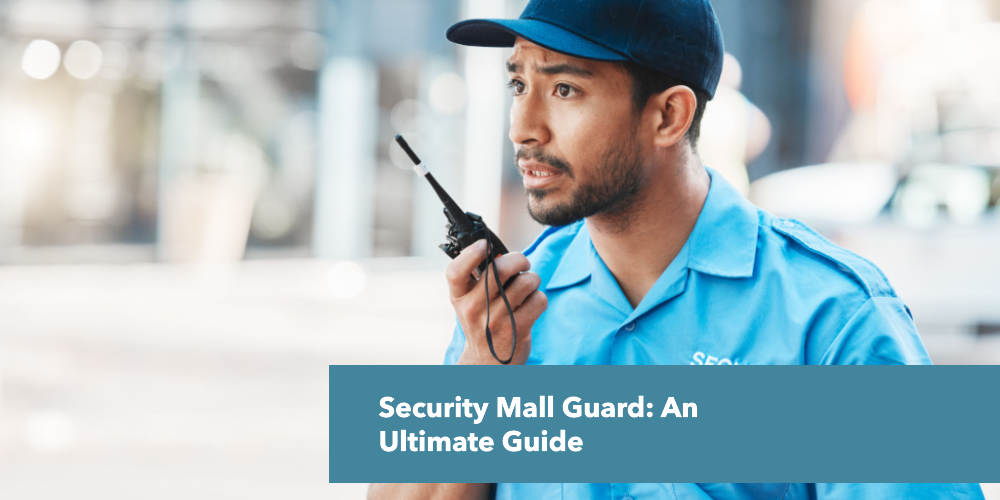What is a Security Mall Guard?
A security mall guard is a professional responsible for maintaining safety, preventing crime, and assisting visitors in shopping malls. They protect property, enforce rules, and respond to emergencies.
What Does Security Mall Guard Do?
Mall Security Officers watch over the grounds of malls, retail centers, and similar shopping locations. Their duties include making sure mall rules are followed, keeping things safe and orderly, helping shoppers, and ensuring parking rules are observed. Here’s a detailed guide below.
Enforce Rules:
You uphold policies like teen curfews (e.g., no minors after 8 PM) or bans on prohibited items (e.g., pets, weapons).
Maintain Security:
Patrol parking lots, stores, and food courts (3–5 rounds/shift), monitor 20–30 CCTV cameras, and detain shoplifters (reducing theft by 30–40%).
Aid Customers:
Assist with lost items, directions, or escorts (about 25% of daily tasks) and respond to medical emergencies (avg. 2–5-minute response time).
Manage Parking:
Enforce time limits (e.g., 2-hour max), ticket violators, and direct traffic during peak hours (e.g., 10,000+ visitors/day).
Prevent Conflicts
Break up fights, deter loitering, and secure restricted areas to keep shoppers and staff safe.
What are the Types of the Security Mall Guards?
The types of security mall guards are including patrol guards, Surveillance Officers, Access Control Guards, Retail Security Guard, Emergency Response Guards.
Patrol Guards:
You’ll see them walking or driving through parking lots, food courts, and stores (3–5 rounds/shift). They deter theft, check emergency exits, and report hazards (e.g., spills).
Surveillance Officers:
Surveillance officers monitor 20–30 CCTV cameras per mall, track suspicious behavior, and alert patrol teams. This role cuts theft risks by 30–40% in monitored zones.
Access Control Guards
Access control guards manage entry points, verify IDs for restricted areas, and enforce teen curfews (e.g., no minors after 8 PM). They log 500–1,000 daily visitors in large malls.
Retail Security Liaisons
Retail security guard usually Stationed in high-theft stores (e.g., electronics shops), they work undercover or in uniform to prevent shoplifting (avg. $1,000/month loss reduction per guard).
Emergency Response Guard
Trained in CPR/first aid (certification cost: 50–50–100), they handle medical crises, fires, or conflicts with a 2–5-minute response time.
Most roles require a state security license (8–40 hours of training) and earn 30,000–30,000–45,000/year. Specialized guards (e.g., K-9 handlers for drug detection) may earn 10–20% more. Each type ensures malls stay safe for 10,000+ daily visitors.
How to Become a Mall Security Guard?
To become as a mall security officer, individuals usually need to be at least 18 years of age, possess a high school diploma or its equivalent, successfully complete a criminal history review, and might be required to complete specific security guard education or obtain a permit depending on where they live. Here’s a detailed guide to become a mall security guard.
Meet Basic Qualifications
Education: You need a high school diploma or GED (required by 85% of employers).
Age: Be at least 18–21 years old (varies by state).
Complete Training & Certifications
Security License: Finish state-mandated training (8–40 hours, cost: 25–25–500). Example: California’s BSIS Guard Card (40 hours).
CPR/First Aid: Earn certification (4–8 hours, cost: 50–50–100) to handle medical emergencies.
Pass Background Checks
Submit to a criminal history review. Felony convictions disqualify you in most states.
Drug tests are required by 70% of employers.
Gain Physical Fitness
Build stamina to patrol 5–8 hours/shift and lift 30–50 lbs (common in incident response).
Apply for Jobs
Use job boards (e.g., Indeed, LinkedIn) or apply directly to malls. Entry-level roles pay 15–15–20/hour (U.S. average).
Highlight skills like conflict resolution or customer service in your resume.
Complete On-the-Job Training
Learn mall-specific protocols (e.g., CCTV monitoring, theft reporting) during 1–2 weeks of supervised training.
Advancement:
Specialize in K-9 units (earn 10–15% more) or become a supervisor (avg. 45,000–45,000–55,000/year).
Renew licenses every 2–3 years (cost: 50–50–150) and pursue certifications like ASP Baton Training (8 hours, $200).
Success Rate: Proper training cuts incident response time by 30% and boosts hiring chances by 50% for entry-level roles.
Connect with Security Mall Guard at Riverside
Protect your business safety with top-tier security guard services in Riverside. At Hyguard Security Inc., our seasoned security officers are adept at enforcing access protocols, scrutinizing entry points, and swiftly addressing any security incidents. Bolster your facility’s defenses and ensure complete compliance with our dependable access control solutions. Contact us today or request a quote to discover how we can strengthen your security and safeguard your valuable assets.

